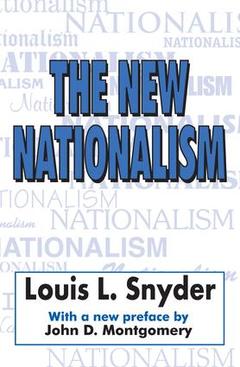The New Nationalism
Auteur : Snyder Louis L.

Nationalism, the state of mind in which the individual's supreme loyalty is owed to the nation-state, remains the strongest of political emotions. As a historical phenomenon, it is always in flux, changing according to no preconceived pattern. In The New Nationalism, Louis Snyder sees various forms of nationalism, and categorizes them as a force for unity; a force for the status quo; a force for independence; a force for fraternity; a force for colonial expansion; a force for aggression; a force for economic expansion; and a force for anti-colonialism.
In Snyder's opinion, nationalism should be differentiated from Theodore Roosevelt's "New Nationalism," a phrase he borrowed from Herbert D. Croly's The Promise of American Life. Croly warned that giving too much power to big industry and finance would lead to the degradation of the masses, and that state and federal intervention must be pursued on all economic fronts. Roosevelt expanded upon this concept, and saw the flourishing of democratic government as a means of reviving the old pioneer sense of individualism and opportunity. Snyder, in contrast, extends the work of the two major pioneers in the study of modern nationalism, Carlton J. H. Hayes and Hans Kohn, in exploring this most powerful sentiment of modern times, and showing how it relates to the political, economic, and psychological tendencies of historical development.
Louis L. Snyder was appointed a Full Professor at The City University of New York in 1953 and retired to Princeton, New Jersey in 1977 with a total of forty-four years of teaching. His books include The Meaning of Nationalism, German Nationalism, The War: A Concise History, 1939-1945, The World in the Twentieth Century, and The Making of Modern Man.
John D. Montgomery, director of the Pacific Basin Research Center of Soka University of America, is also Ford Foundation Professor of International Studies, Emeritus, at Harvard University. He is the author of Forced to Be Free, The Artificial Revolution in Germany and Japan, The Politics of Foreign Aid: American Experience in Southeast Asia, and Aftermath: Tarnished Outcomes of American Foreign Policy.
Date de parution : 10-2003
15.2x22.9 cm
Date de parution : 11-2018
15.2x22.9 cm
Thème de The New Nationalism :
Mots-clés :
West Germany; Common Language; Western Nationalism; Asian Nationalism; Modern Nationalism; Liberal Nationalism; Soviet Nationalism; Tanaka Memorial; De Gaulle; American Nationalism; Early Modern Nationalism; Holocaust Family; De Gaulle's Action; Latin American Nationalism; Non-Western Nationalism; Jacobin Nationalism; NATO Capital; Arab Nationalism; Napoleon III; Military Juntas; Chang Chih Tung; Young Man; Freedom Day; African Nationalism; Slavophilic Nationalism



